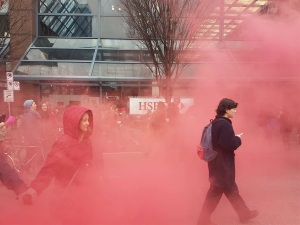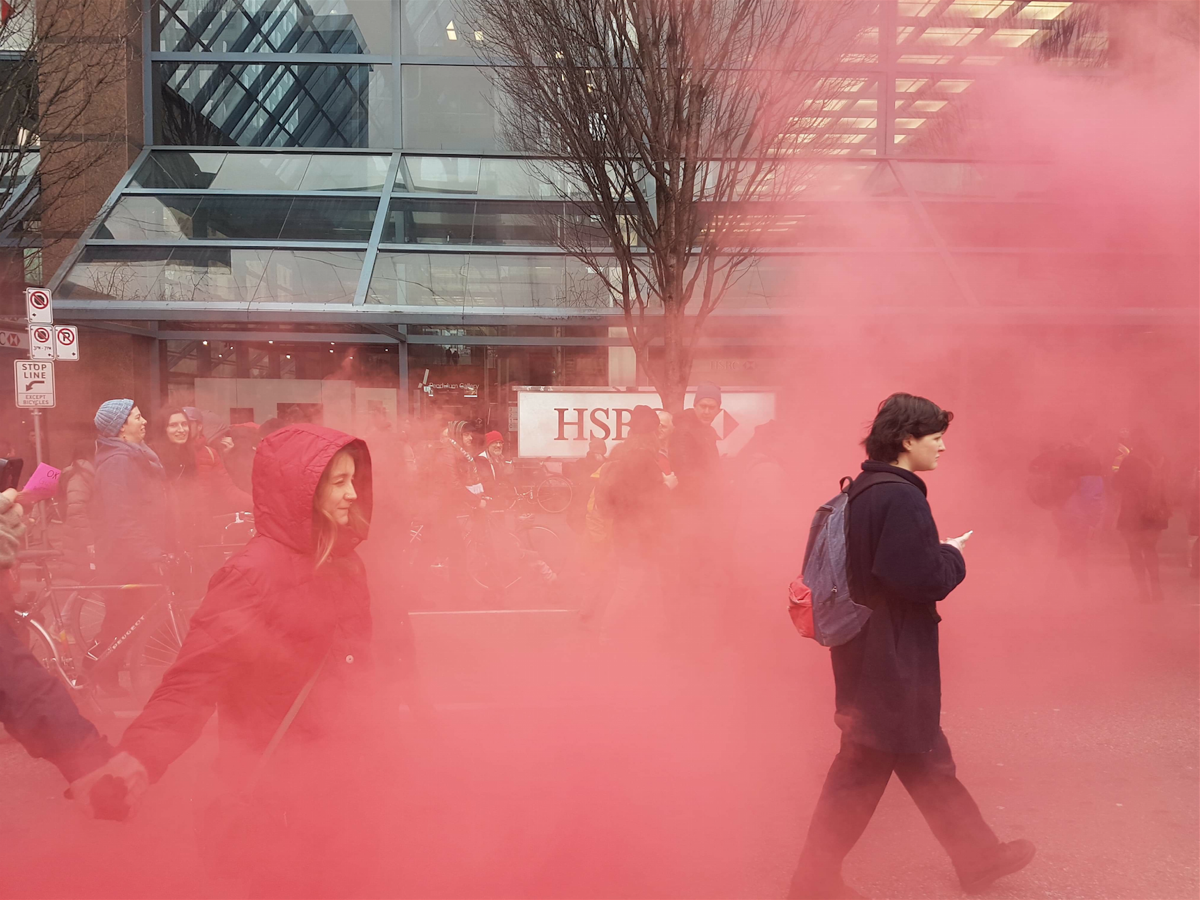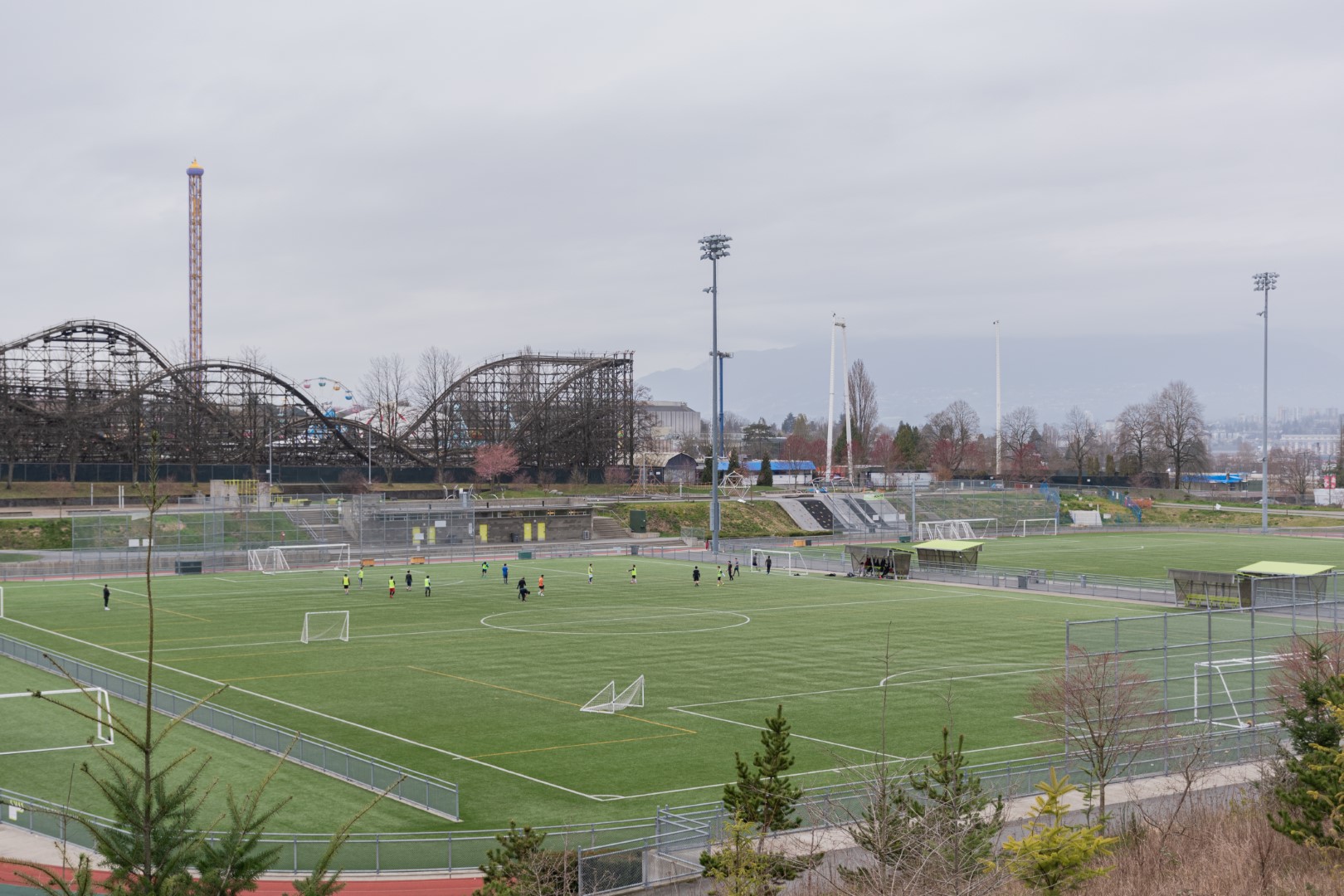
Wet’suwet’en strong as RCMP forcibly remove 14 people from land defender camps
By Bex Peterson, Editor-in-Chief and Katie Czenczek, News Editor
Hundreds of people gathered outside the BC Supreme Court building on January 8 in response to the court injunction allowing the RCMP to break up camps along the projected Coastal GasLink pipeline path.
This followed a worldwide trend of people showing solidarity for those in Northern BC protecting Indigenous traditional land. Around 60 cities Canada-wide held protests outside their respective government buildings. Some came out because they believe the rights of Indigenous peoples are being infringed upon in Wet’suwet’en territory, while others are against the pipeline construction based on environmental concerns.
During the opening remarks at the Vancouver protest, Audrey Siegl from the Musqueam Nation said, “We all know that Canada is founded on genocide and for the purpose of ecocide. Commodifying what is sacred to us won’t be happening anymore.”
As Siegl spoke, people gathered around her in a drum circle to show support of her message. This demonstration happened underneath the overpass on Smithe Street, which reverberated loudly. It would have certainly been loud enough for the BC Supreme Court to hear from inside the building.
Throughout Siegl’s remarks, she put forward a message of hope. She said that being outraged is good and what is needed right now.
“Canada won’t start listening until it starts costing them,” she said. “So now that it’s going to start costing Canada—whether it’s shutting down roads, whether it’s spending our money wisely, pulling out of their banks—that’s what we need to do.”
Following the opening remarks, everyone began the march to Victory Square. Cars that drove by honked in support of the protest and many bystanders either joined the march or stuck around to find out what was happening. The protest briefly stopped outside of Canaccord Genuity Wealth Management where over eight police officers barricaded the entranceway into the building.
When asked why the police presence was especially large outside of this building, one police officer responded, “There just is.” Canaccord Genuity Wealth Management has ties to the Coastal GasLink pipeline construction, which may explain why the police were sent out there.
On December 21, the BC Supreme Court passed an injunction that would allow the RCMP to go into Wet’suwet’en traditional territory and remove those who are blocking the construction of the Coastal GasLink pipeline. The circumstances of the Wet’suwet’en conflict are often described as being quite complicated. To get a better understanding of the situation, there are several terms and historic cases brought up that are worth delving into.
Part of the Wet’suwet’en conflict is based in the friction between the elected chief and band council and the hereditary chiefs. The elected chief and council have approved the pipeline project—however, the hereditary chiefs are opposed. The question here becomes one of jurisdiction; according to The Tyee, “the 13 hereditary chiefs argue that the elected chief only has jurisdiction over the band’s reserves, and that hereditary chiefs retain jurisdiction over the traditional territory where the checkpoint and camps are located.”
There is an added level of conflict between elected chief and council and hereditary chiefs, as the “band council” system was imposed by the Indian Act of 1876. While the Act has undergone many changes over the past century, it has been responsible for many injustices carried out against Indigenous peoples by the Government of Canada—including residential schools and the cultural genocidal “Potlatch Law.” This has caused some to question the moral and legal legitimacy of the band council system, especially in situations such as this one.
When discussing jurisdiction it also becomes important to take into account the 1997 Delgamuukw Case. Officially known as Delgamuukw v. British Columbia, the case also involved the Wet’suwet’en nation. The Delgamuukw Case outlined and clarified the concept of “Aboriginal title”—specifically concerning the ownership of traditional territories.
The case affirmed Indigenous peoples’ ancestral rights to their land and highlighted the Canadian government’s duty to consult in cases such as this one. The case also affirmed oral history as legally legitimate in the eyes of Canadian law. As Wet’suwet’en territories are unceded and no treaties have been signed, the land is under Wet’suwet’en protection and jurisdiction.
Elizabeth May, leader of the Green Party, said in an interview with the Other Press that the Trudeau government is failing to adhere to international law as well as Indigenous law.
“I’m here in solidarity with the Wet’suwet’en people for what happened on their territory and as a Member of Parliament and leader of the Green Party, I’m very committed to settler-culture governments operating in respect to the UN Declaration of Rights of Indigenous Peoples (UNDRIP) and that’s not happening.”
The declaration May referenced echoed what many signs referred to at the protest, along with what many people have been referencing online. Article 10 of the UNDRIP declaration states that “Indigenous peoples shall not be forcibly removed from their lands or territories.”
Many have argued that the RCMP’s actions last Monday violated this article, as the RCMP forcibly removed 14 land defenders from Wet’suwet’en territory in the course of the arrests. Article 26 of UNDRIP has also been cited, since—like the Delgamuukw case—it upholds Indigenous peoples’ rights to their ancestral lands and territories.
At Victory Square, Grand Chief Stewart Phillip from the Okanagan said a few words about the pipeline and gave the prime minister a warning.
“I want to say to Prime Minister Trudeau: Welcome to battleground BC.”
On January 9, a tentative agreement was made to allow workers from Coastal Gaslink through the Unist’ot’en camp. The hereditary chiefs made it clear that they do not consent to the pipeline construction but are willing to temporarily take down the camps if there is ongoing dialogue between them and the RCMP.


